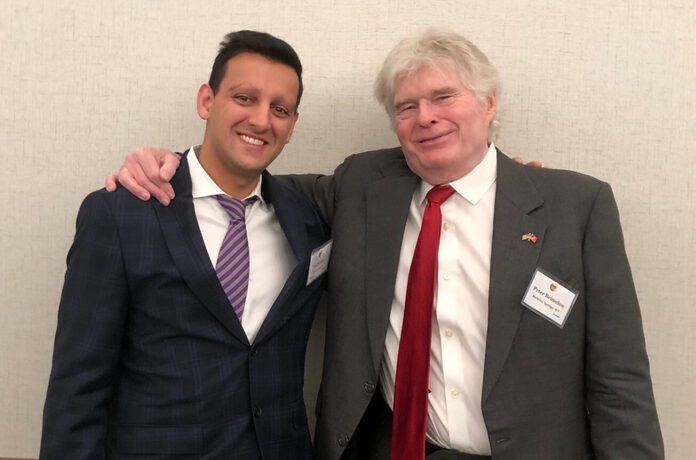
“So just imagine one person, like myself, on the floor of Congress talking about white interests, white advocacy,” Neil Kumar muses. He’s on white nationalist Jared Taylor’s “American Renaissance” podcast. The date is Feb. 9. “That would change the global conversation. I mean, it would make national headlines, it would push the Overton Window, it would make it—it brings white advocacy into the mainstream.”
Kumar, a 26-year-old self-described “white advocate,” faces off against incumbent Republican Rep. Steve Womack in Arkansas’ 3rd Congressional District today. Kumar isn’t expected to win, but that’s not the point. The point is to move the Overton Window—the band of acceptable discourse—to include white nationalist ideology and the deadly great replacement theory. And white nationalists are eager to help him do that.
Kumar is an unlikely conduit for such ideas. Born to a white mother and Indian father who immigrated to the United States, his own family is a product of immigration. Nevertheless, Kumar prides himself as a member of the Sons of Confederate Veterans, and he has written for multiple white nationalist and neo-Confederate outlets, including American Renaissance, VDARE, Identity Dixie, and Reckonin’ in which he peddles the great replacement theory. (He once referred to President Abraham Lincoln as “the godless genocider-in-chief.”) His writings and speeches have landed him invitations to a number of white nationalist platforms and the endorsements of Peter Brimelow, Jared Taylor, Greg Johnson, and Robert Wallace, and radical conspiracy theorist Stew Peters.
The first promise of Kumar’s platform is to “Stop the Great Replacement.” An old racist ideology that has gained new life in recent years, the great replacement theory posits that the so-called white race is at risk of being destroyed by Black and other non-white people. Some antisemitic versions, including the one Kumar subscribes to, push the lie that immigration is a scheme created by Jewish people to “replace” white Americans with people of color. The Buffalo shooter, who targeted Black people in a Buffalo, New York, supermarket, killing 10, cited the theory in his manifesto. Kumar’s platform calls for imposing a 20-year moratorium on all immigration, though he would make an exception for white Afrikaners. He also calls for ending “birthright citizenship.”
“I make no distinction between legal and illegal immigration because they’re both the same: an attack on our national sovereignty and an attack on white America,” Kumar told Taylor. “So what I’m calling for is a 20-year moratorium on all immigration, deporting every illegal, building the wall, and then in the meantime, ending birthright citizenship, denying public services to illegals, and taxing remittances at up to 100 percent.”
Such rhetoric has won him the derision of the Arkansas GOP, which went as far as to designate Kumar a “non-recommended candidate” in a rare move. In the October 2021 announcement, the state GOP said that it won’t endorse or defend “racist, bigoted, sexist or threatening language by any candidate.”
The designation didn’t sit well with Kumar. Later that month, he joined Stew Peters on his show to lash out at the Arkansas GOP and the “satanic globalist cabal.”
“I’m a threat to their entire anti-white, America-last grift,” Kumar told Peters. “I’m calling for a 20-year immigration moratorium. I’m a threat to the great replacement, their white genocide agenda. There’s ethnic cleansing at the southern border, and they’re aiding and abetting it.”

In February, Greg Johnson and Robert Wallace invited Kumar onto their white nationalist podcast “Counter-Currents.” Johnson—who has made Counter-Currents one of the most ardent advocates for a white ethnostate as its editor-in-chief—asked Kumar why he was running, and why he was running as a Republican.
Kumar said he despised the Republican Party and that he had aligned himself with the party as a necessity. But his answer also shows how he appeals to Republicans by referring to ideas made popular by the GOP’s hysteria over critical race theory, even as he leaned heavily into conspiratorial rhetoric.
“White genocide is real,” Kumar said. “There’s a cultural genocide going on monuments, history books, anything which celebrates the white heroes and pioneers who built this nation is being burned to the ground. We have no borders, the regime allied with a constellation of NGOs and ‘charities’ with infinite funding is engaged in ethnic cleansing and erasing whites from the nation which they single handedly built.”
But before the conversation could get too far, Johnson had to address something for his audience: that “Neil Kumar isn’t even entirely white.”
“You don’t have to be entirely white to be a white advocate,” Johnson told his audience. “I think it’s quite remarkable that here’s a guy of mixed heritage, who sees the great replacement as a problem and wants to stand up and fight against it. And I don’t think it’s a valid criticism of him.”
Robert Wallace agreed but for different reasons. Kumar, he argued, was an effective vehicle for white nationalists’ goal: to normalize white nationalist ideas to “the patriotic American public.”
“We have a very firm and clear goal. And that is the goal that we outlined in our ‘America’s ready for white identity politics’ article, that is to normalize in [the] mainstream pro-white politics to the patriotic American public,” Wallace said. “So the question, the question, the criteria, here is: Neil Kumar, Michelle Malkin, are they effective towards getting us closer to that goal or not? And my firm opinion on this is that Neil is effective. And so we need to be as ruthlessly calculating and pragmatic as our enemies are, in order to beat them.”
Greg Johnson agreed. “Because what’s great about Neil’s candidacy is that he’s talking about our principles. He’s standing up for our principles. And that changes the political debate. That shifts, as they say, the Overton Window, and that is going to provide encouragement to other candidates as well.”
Even as both made their case to support Kumar to their white nationalist audience, Johnson posed the question to Kumar. “So, Neil, how do you square the fact that you’ve got a mixed heritage with the fact that you’re standing up against the great replacement and for the white majority in Arkansas and America as a whole?”
Kumar pointed to his white heritage—“I’ve got at least eight ancestors that fought for the Confederacy”—and leaned on his own racist views of Black Americans. He claimed to have had an “awakening” to “the reality of racial differences” when he went to college at the University of Chicago: “You see black crime, you see that race differences are not about skin color, they’re much deeper than that, much more fundamental, much more primal.” Donald Trump’s 2016 presidential campaign was another influence. “I saw every center of institutional power on earth come down on this man for daring to talk in a relatively oblique way about the concerns of whites,” he told them. “And I’m thinking, you know, ‘Wow, he’s really onto something.’”
***
In 2019, a white gunman targeted Muslim worshippers in Christchurch, New Zealand. He killed 51 people and injured 40. Like the Buffalo shooter, the killer said he was influenced by the great replacement theory.
Two days later, Peter Brimelow, the editor of the white nationalist-promoting VDARE website, said it could have been prevented, not by battling the racist ideology, but “by ending mass Third World immigration” that represses “the white host nations.”
On Monday, Peter Brimelow applauded Kumar for advancing an immigration moratorium, a longtime goal of white nationalists. He shared that he had offered Kumar advice, though he says Kumar often ignored it.
“I support Kumar for the same reason I maxed out to the heroic Lauren Witzke in her 2020 Delaware Senate race: both explicitly raised the issue of an immigration moratorium,” Brimelow wrote. “I don’t expect Kumar to win—although miracles happen—but I do expect the idea of an immigration moratorium to continue to advance.”
He pointed to polling that showed that nearly half of Republicans believe in the great replacement theory. “I don’t think it will take them that long to get the message that an immigration moratorium is the only way forward for America.”
***
Kumar is all but certain to lose Tuesday. But in his conversation with Jared Taylor, Kumar defined a successful campaign by a different measure.
“The ultimate goal is to have a successful campaign,” Kumar said. “And how I define success is, just like you said, mainstreaming these issues, mainstreaming these ideas, showing people, showing other potential candidates, showing currently elected officials, and just showing normal citizens that it’s okay to defend white interests openly, that it’s okay to run on these issues and talk about them.”
“I talk about white genocide, and people understand,” Kumar said. “And so when they see someone openly campaigning on these issues, they feel freer to talk about it.”







